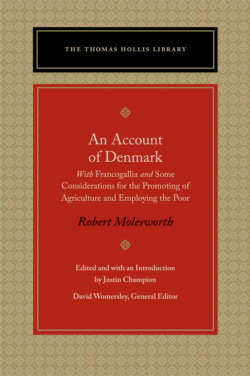Читать книгу An Account of Denmark - Robert Molesworth - Страница 8
На сайте Литреса книга снята с продажи.
Robert Molesworth and Gothic Liberty
ОглавлениеRobert Molesworth (1656–1725) famously diagnosed the causes of a disordered commonwealth in the much reprinted and translated An Account of Denmark (1694).1 His works connected the three ages of revolution between 1649 and 1776.2 According to his insights, manners and customs were shaped by the experience of the institutions and laws of a nation: liberty was cultivated by the land. Through his writing, his parliamentary career, and his stewardship of his own country estates in England and Ireland, Molesworth embodied republican ideals of the industrious and independent gentleman, stalwart in defense of public liberty, hostile to tyranny, yet dynamic in nurturing improvement.
A consistent defender of “civil rights,” Molesworth conceived his political career as defending the continuing liberty first manifest in the “ancient free state.” He hoped “that my friends, relations and children, with their posterity, will inherit their share of this inestimable blessing, and that I have contributed my part to it.”3 A defense of this vision was the consistent pattern of his post-1689 life. The edition of the radical Calvinist writer François Hotman’s Francogallia (1574) executed in 1705, first published in 1711 and republished in 1721, is testimony to this durability of political commitment and indeed to Molesworth’s political imagination in reconfiguring Hotman for an eighteenth-century readership.
John Cannon has dismissed Molesworth’s legacy as one of “bookish radicals with antiquarian tastes” whose “scale of operations was small, their impact on important politicians slight, and their influence on the public at large negligible.”4 This volume aims to provide evidence to the contrary.
Unlike many modern historians, Molesworth perceived no discontinuity between the commonwealth ideologies of the 1640s and the 1700s: the core principle of this ideology was that “the Good of the Whole is taken care of by the Whole.”5 Importantly, this made the question of whether a monarchy existed constitutionally irrelevant; as he put it, “the having a King or Queen at the Head of it, alters not the Case.”6 Such a political community, committed to universal liberty, and independent of religious confession, would encourage each to use their “Body, Estate, and Understanding, for the publick Good.”7 The end of such a community was to provide the grounding for improvement so that each could “securely and peaceably enjoy Property and Liberty both of Mind and Body.”8 By such provision both individuals and the entire community benefited: as he clarified, “the thriving of any one single Person by honest Means, is the thriving of the Commonwealth wherein he resides.”9 Molesworth’s conception of the purpose of political society was to enable a flourishing and industrious civic life.
Molesworth’s political reputation as “the patriot brave and sage” was shaped by the reception and afterlife of his first and most infamous work, An account of Denmark as it was in the year 1692 (1694), a republican counterblast to modern tyranny.10 Combined with his defense of the Glorious Revolution of 1689, his translation of François Hotman’s Francogallia (1574), and the evidence of a parliamentary career (in England and Ireland) that spanned three decades, Molesworth has been recognized as the last of the “Real Whigs.” Understood through the historiographical prism of Caroline Robbins’s The Eighteenth-Century Commonwealthman, Molesworth and his friends exercised a powerful influence over the “Republican fringe” of eighteenth-century Whiggism. It is worth citing her conclusions at length:
The Whiggish malcontents or Commonwealthmen in varying ways provided a deterrent to complacency, and reminders of the need for improvement and the continual adaptation of even good governments to economic and political changes. . . . In an age when Englishmen stressed the sovereignty, not of a divinely appointed king but of a triumphant parliament, the Real Whigs reminded them of the rights of electors and of the unenfranchised, of the virtues of rotation in office and of the necessity of constant vigilance against the corruptions of power whether wielded by king, ministers or estates. Molesworth and his friends admonished their countrymen about present dangers. They called attention to the lessons of history and the possibilities of the future.11
This account of the powerful and persisting legacy of Molesworth’s republican critique of monarchy and public power is worth reassessing in the light of more contemporary historical writing, which characterizes the eighteenth century as an age of ancien régime institutions and cultural values.
The rallying call of what Thomas Hollis admiringly referred to as Molesworth’s “golden prefaces” continued, decades later, to exercise an enchanting authority over oppositional ideologies, most notably mobilizing support around John Wilkes in the 1760s and those defending colonial independence in the 1770s.12 The longer works, which presented a neo-Tacitean account of the mechanics of modern tyranny, meshed with the writings of Trenchard and Gordon to provide a standard source for the analysis of political corruption. Unlike Locke, Molesworth provided insight into processes of corruption rather than simply a set of prescriptive juristic values. In the Account of Denmark especially, Molesworth established how tyranny worked, identifying the contaminating ideologies and institutions. De jure divino claims to authority—the “designs of priestcraft”—especially from the Church, lay at the root of all perfidy.13
Molesworth’s works, reprinted throughout the eighteenth century, were read in the British Islands, continental Europe, and North America— where Benjamin Franklin, Thomas Jefferson, John Adams, James Madison, and James Logan all owned copies. The Elegy printed upon his death celebrated Molesworth’s deeds, not just as a defender of the Revolution but as “the labourers friend.” Just as his political and diplomatic acts saved the kingdom from “a proud oppressing slave,” so his improving economics “found work for one hundred-thousand hands.”14
